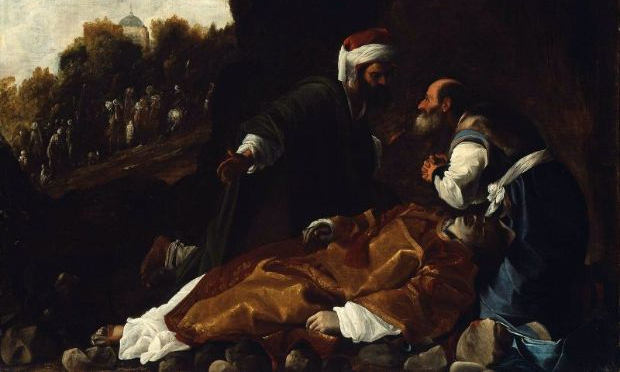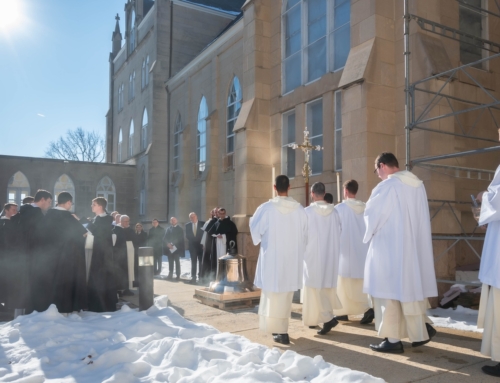It’s another swelteringly hot day in Jerusalem and many good Jews, on their way into the Temple for worship, stop for a break in the shade of Solomon’s Portico. There they find a group of men (twelve to be exact) working many healing miracles and preaching in the name of Jesus the Nazarene.
Wasn’t this Nazarene they’re speaking about the one we saw crucified a few months ago? many ask each other. And many others began to follow these men.
Soon, though, the word gets to the Temple authorities that this Nazarene’s followers just can’t let this issue go. They’re still claiming he is the Messiah—even though he was executed several months ago!
The twelve men (called Apostles by their followers) are arrested on the spot—but wait! Rumor has it that an angel has let them out of prison, because, the very next day—to the disbelief of the High Priest’s council—they’re right back at their preaching and healing again.
This time, fearing reprisal from the crowd, the High Priest orders that these twelve men be apprehended peaceably and brought into the council chamber for questioning.
The High Priest spoke up first: We vehemently forbade you from teaching in the name of this Jesus; but you have spread your teaching throughout all of Jerusalem, and now you’re trying to blame us for this man’s death!
But Peter and the Apostles answered: We must obey God rather than men. Jesus is the Messiah for whom we have waited. He is the Son of God. He was raised from the dead (after you killed Him), and we are witnesses of this.
This, naturally, enraged the councilmembers who were demanding the death of these men. But a wise and prudent Pharisee named Gamaliel, respected by all for his character and for his legal scholarship, asked for the prisoners to be removed from the chamber so that he might address the council.
Men of Israel, he began, think twice and be careful about what you do with these men. We all know the story of how, long ago, a certain Theudas attracted a large number to himself, also claiming to be the Messiah; but he was killed and his followers dispersed.
Then, about 30 years ago, Judas the Galilean arose and led away some followers of his own—but he died, too, and his followers were also scattered.
So in these present circumstances I warn you to keep away from these men—let them be! For if this plan or this undertaking is of men (as were those previous ones), it will fail. But if it is of God, it will last. You will not be able to overthrow them. Instead, you might even find yourselves opposing God! So let these men alone.
And the council took Gamaliel’s advice, even though they first had the Apostles scourged before releasing them.
***
If it is of God, it will last. A wise Jesuit I know calls this attitude The Gamaliel Principle.
If this leader or that institution is willed by God, you will see it last. If it is a result of the follies of men, you will see it quickly disintegrate. Initiatives that are not backed by the power of God will tend to exist for a time and then pass away.
But if it is of God, it will last. The Gamaliel Principle is a helpful lens through which to view all the things that might disturb us about the state of the world, the country, the Church.
Gamaliel’s wisdom assured him that God would never abandon those to whom He had revealed Himself: though they had suffered wars, persecutions, and exiles, God always used the evil to bring about good. He never let the false prophets win—they each disintegrated in their own time.
Instead, God guides His flock according to an eternal and incorruptible plan. So, we can have a good hint of what is of God by observing which teachings and institutions endure—and which do not.
✠
Image: Carlo Saracini, Saint Stephen Mourned by Saints Gamaliel and Nicodemus







